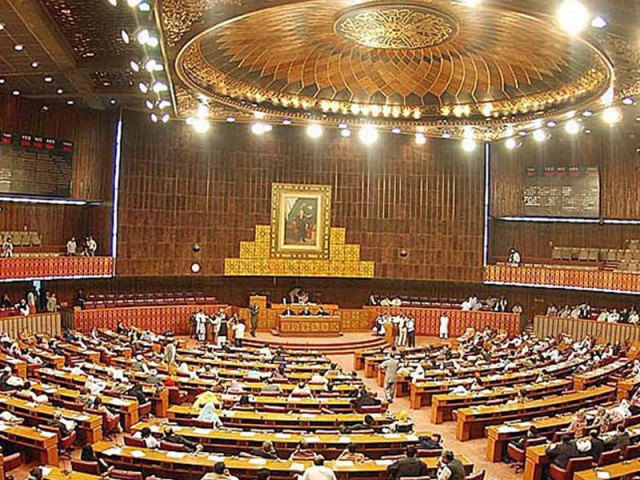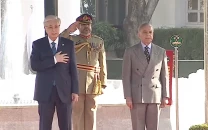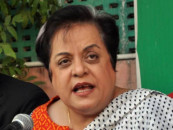Judicial reforms set to roll through parliament
At least 22 amendments on the docket,CJ's appointment method may be revamped, Changes aim at overhauling justice

Amid swirling speculation about legislation to extend the retirement age of superior court judges, the federal government is preparing to roll out a comprehensive judicial reforms package in parliament, likely within the next two days.
With at least 22 amendments on the docket, these changes are set to overhaul the justice system and revamp the process of appointing the chief justice of the Supreme Court, according to well-placed sources.
Sources say the government has a few cards up its sleeve, with plans to introduce these reforms as early as Sunday.
The proposal's centrepiece is introducing a new appointment process for the chief justice. Under the proposed changes, the parliamentary committee and judicial commission could be merged.
Instead of automatically appointing the senior-most judge, a panel of five senior judges would be sent to the prime minister, who would have the final say.
The government believes the current practice of appointing the senior-most judge encourages lobbying within the judiciary, allowing the CJ to manipulate the seniority list to favour his preferred successors.
By giving this decision-making power to the prime minister, the government hopes to curb internal politicking within the judiciary.
The reform package also includes a proposal to allow transfers of judges from one high court to another, a move that would increase flexibility within the judicial system.
However, one key issueraising the retirement age of judgesremains a bone of contention, with no agreement reached as of yet.
Despite some disagreements, all coalition parties are reportedly in agreement on the core judicial reforms.
It is pertinent to note that JUI-F chief Maulana Fazlur Rehman indicated in a recent statement that if a reform package on judicial matters is presented, it will be carefully considered.
Sources indicate that the government is keeping its cards close to its chest. Prime Minister Shehbaz Sharif has discussed the package with a tight circle, including senior PPP leadership, but the rest of the coalition has yet to receive a full briefing.
It appears that the government is preparing to throw this package into the National Assembly with little prior information, ensuring the element of surprise.
If passed, the reforms could mark a seismic shift in the country's judiciary, shaking up long-established procedures and leaving a lasting impact on how the judicial and executive branches interact.
The government took an unusual step on Friday as it summoned sessions of both the National Assembly and Senate on a holiday – Saturday (today). The hurriedly-called session has given further rise to speculations that the ruling alliance might introduce judicial reforms or constitutional amendments.
On one hand, Defence Minister Khawaja Asif reportedly asserted that the government is all set to table a 'constitutional amendment' in the assembly on Saturday as it has achieved the 'magic number'. On the other, Federal Minister for Law and Justice (Retd) Azam Nazir Tarar reportedly denied that the government is likely to go for any constitutional changes.
Despite the contradictory statements, the notion is that the government is likely to make some constitutional changes, such as increasing the retirement age of judges. Such a move can lead to an extension in the tenure of incumbent chief justice of Pakistan (CJP).
CJP Qazi Faez Isa is set to retire on October 25, 2024, upon reaching the age of superannuation – 65 years. However, Islamabad is abuzz with rumours that the government is considering extending his tenure by raising the retirement age for Supreme Court judges.
Though the CJP has expressed that he was not interested in a person-specific extension, experts closely monitoring political and judicial developments say that this varied statement has kept the door open for an extension.
Currently, the retirement age of SC judges is 65, while the same for high court judges is 62. Reports and statements given by different lawmakers in the parliament suggest that the government intends to increase SC judges' retirement age to 68 and high court judges to 65.
Recently, a government member also brought a bill, seeking to increase the number of SC judges. However, it was deferred without being introduced in the NA.
The debate about constitutional amendment was triggered soon after the Supreme Court's landmark decision on July 12 in favor of PTI regarding the allocation of reserved seats in national and other assemblies. The decision deprived the ruling alliance of a two-thirds majority.
Nevertheless, in the absence of SC's detailed judgment and review petitions by the ruling parties, coupled with amendments in the Election Act of 2017 which bar legislators to choose a political party once they have exhausted the option, the situation has not only become complicated, but allowed the government to come up with different amendments or new laws.
The number game
However, it would be interesting to see how the ruling coalition completes the required number of 224 seats out of 336 in the NA and 64 out of 96 in the Senate if it goes for a constitutional amendment. Currently, the ruling party lacks a two-thirds majority in both the houses, which is required for passing a constitutional amendment.
At the moment, the total number of seats of the ruling alliance stands at 213, including 111 of the PML-N, 68 of PPP-P, 22 of Muttahida Qaumi Movement-Pakistan (MQM-P), five of Pakistan Muslim League-Quaid (PML-Q), four of Istehkam-e-Pakistan Party (IPP) and one each of Balochistan Awami Party (BAP), National Party (NP) and Pakistan Muslim League-Zia PML-Z).
On the contrary, the opposition alliance has a total of 99 seats, including 88 of SIC & independents – primarily PTI , eight of the Jamiat Ulmae-e-Islam-Fazl (JUI-F) and one each of the Balochistan National Party-Mengal (BNP-M), Pashtunkhwa Milli Awami Party (PKMAP) and Majlis Wahdat-e-Muslimeen (MWM).
In total, number of ruling alliance and opposition parties reaches to 312 seats in the National Assembly. A total of 20 reserved seats for women and four seats of minorities takes the tally to 336 – the total strength of the house.
The situation in the Senate is more complicated as no elections have taken place for 11 seats of Khyber-Pakhtunkhwa yet, leaving the house's strength at 85. The NA session is set to begin at 3pm, while the Senate will start proceedings by 4pm. Although Saturday is a holiday, the secretariats of both houses of parliament will function as per routine.
With additional input from Rizwan Shehzad



















COMMENTS
Comments are moderated and generally will be posted if they are on-topic and not abusive.
For more information, please see our Comments FAQ